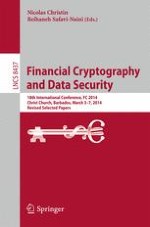2014 | OriginalPaper | Buchkapitel
Mixcoin: Anonymity for Bitcoin with Accountable Mixes
verfasst von : Joseph Bonneau, Arvind Narayanan, Andrew Miller, Jeremy Clark, Joshua A. Kroll, Edward W. Felten
Erschienen in: Financial Cryptography and Data Security
Verlag: Springer Berlin Heidelberg
Aktivieren Sie unsere intelligente Suche, um passende Fachinhalte oder Patente zu finden.
Wählen Sie Textabschnitte aus um mit Künstlicher Intelligenz passenden Patente zu finden. powered by
Markieren Sie Textabschnitte, um KI-gestützt weitere passende Inhalte zu finden. powered by
